中考英语易混词汇辨析
英语中考常考易混词汇辨析(G-M)

2022 中考常考易混词汇辨析(G-M开头)(配练习+答案)9. jeans/ trousers / pants/ shoes 等成双成对的词的主谓一致问题10. 【参加】的词组Practice1. The sun is shining. Don't look at the sun.A.gold; straightB.golden; straightlyC.golden; straightD.gold; straightly2. —Do you come from ?—No. But I can speak well.A.Germany; GermanB.German; GermanyC.Germany; GermanyD.German; German3. Students will make progress if they a subject.A.be made ofB.be made fromC.be made up ofD.be made in4. The kite is paper, and the paper is trees.A.made of; made fromB.made from; made ofC.made of; made inD.made from; made in5. It's getting dark, let's , shall we?A.go on to workB.go on workingC.to go on workD.to go on working6. Students to study. Their parents to pick them up.A.go to the school; go to the schoolB.go to school; go to schoolC.go to the school; go to schoolD.go to school; go to the school7. Boys and girls, time is up, please check your name and your papers.A.hand outB.hand upC.hand inD.hand down8. The hunter the fox, took off its skin and it on the tree.A.hung; hangedB.hung; hungC.hanged; hangedD.hanged; hung9. Our teacher often tells us different events that have strong influence on China.A.historic; historyB.historical; historicC.history; historyD.history; historic10. In order to have a better understanding of those places of interest, she read some books before the visit.A.historical; historicalB.historical; historicC.historic; historicalD.historic; historic11. Why don't you us to the speech contest?A.join; joinB.take part in; take part inC.take part in; joinD.join; take part in12. A is a long journey on a ship or in a spacecraft.A.tourB.voyageC.tripD.continent13. The boy's mother is . He has to look after his mother at home.A.bad; sickB.ill; badC.ill; sickD.sick; ill14. This year's Government Work Report many issues economic growth, environmental protection, etc.A.includes; includingB.include; includingC.is included; includeD.including; include15. Thousands of people lost their in the earthquake, so we should value our daily .A.lives; lifeB.life; lifeC.lives; livesD.life; lives16. Independence does not mean (shut)the door to the world.本章答案1-5 BACAB 6-10 DCDDC 11-15 DBCAA 16. shutting。
中考易混清词汇unusual

中考易混清词汇unusual中考英语考试中,经常会涉及一些词汇的辨析,有些单词很相似,容易混淆。
本文将重点介绍一组常见的易混清词汇——"unusual","ordinary"以及"unique"。
希望通过本文的解析,能够帮助大家更好地理解和运用这些词汇。
一、unusual"unusual"是一个形容词,意思是“不寻常的”或者“罕见的”。
它用来描述与平常不同的、不寻常的事物或情况。
当我们遇到一些不同于日常经历的事情时,我们可以使用"unusual"这个词。
比如,一个在街上戴着奇特帽子的人,我们可以说他穿着不寻常。
再比如,突如其来的雨雪是一个不寻常的天气现象。
二、ordinary"ordinary"也是一个形容词,意思是“普通的”或者“常见的”。
它用来描述那些我们日常生活中接触最多的事物和情况。
与"unusual"相比,"ordinary"强调的是符合常规、常见的特点。
比如,我们每天都会见到普通的公交车,普通的食物,这些都属于ordinary事物。
三、unique"unique"同样是一个形容词,意思是“独特的”或者“独一无二的”。
它用来形容那些独一无二的事物,与其他事物不同。
与"unusual"相比,"unique"更加强调某个事物的独特性,指的是只有一个或者很少几个。
比如,著名画家达·芬奇的画作就是unique的,因为没有人能够完全复制他的作品。
在使用这些词汇的时候,我们需要注意它们的搭配和用法。
比如,我们可以说一个人的外表很unusual,但不可以说他很unique,因为unique的意思是"独一无二的",用来形容事物而不是人。
另外,我们可以说一个事物是ordinary和unusual的,但不可以说它是ordinary和unique的,因为这两个词意思相对矛盾。
中考英语重点词汇复习: 辨析Each Every Either Neither

辨析Each Every Either NeitherEach和Every,Either和Neither都是很容易混淆的词,也是考试中常遇到的考点,更是同学们感到迷惑容易失分的地方。
其实只要掌握了基本用法和常用句型,还是很好区分的。
下面结合例句谈谈这几个词的用法。
前两个都表示每一个,每个的,各自的,区分起来有点难度;Either是或者……或者……,neither是两者都不……。
These distributive words are normally used with singular nouns, and are placed before the noun.这些词通常与单数名词连用,并放在名词之前。
Each, either and neither can be used with plural nouns but must be followed by of.Each, either 和 neither 与复数连用时后面必须接 of。
Each is a way of seeing the members of a group as individuals.Each是针对整体中的每个个体而言。
Each child received a present./Each of the children received a present.每个孩子都可以得到一份礼物。
Every is a way of seeing a group as a series of members.Every是针对整体中的一系列成员而言。
Every child in the world deserves affection.全世界的孩子都应该受到爱护。
It can also express different points in a series, especially with time expressions.尤其在时间的表达上,every也可以表示一系列不同的点。
中考英语学科易混淆词汇辨析单选题50题
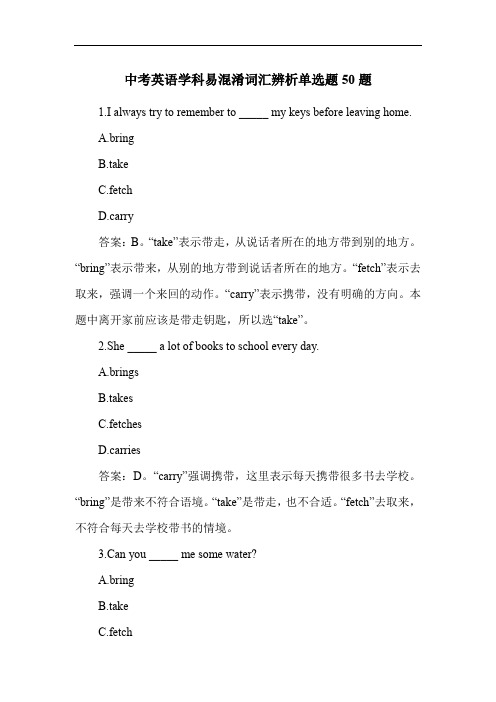
中考英语学科易混淆词汇辨析单选题50题1.I always try to remember to _____ my keys before leaving home.A.bringB.takeC.fetchD.carry答案:B。
“take”表示带走,从说话者所在的地方带到别的地方。
“bring”表示带来,从别的地方带到说话者所在的地方。
“fetch”表示去取来,强调一个来回的动作。
“carry”表示携带,没有明确的方向。
本题中离开家前应该是带走钥匙,所以选“take”。
2.She _____ a lot of books to school every day.A.bringsB.takesC.fetchesD.carries答案:D。
“carry”强调携带,这里表示每天携带很多书去学校。
“bring”是带来不符合语境。
“take”是带走,也不合适。
“fetch”去取来,不符合每天去学校带书的情境。
3.Can you _____ me some water?A.bringB.takeC.fetch答案:A。
“bring”表示带来,这里是让对方给自己带来一些水。
“take”带走不对。
“fetch”去取来,没有“bring”直接。
“carry”携带,不是此处的意思。
4.He went to the library to _____ a book.A.bringB.takeC.fetchD.carry答案:C。
“fetch”表示去取来,去图书馆取一本书符合这个意思。
“bring”带来,从图书馆的角度不是带来。
“take”带走,不太准确。
“carry”携带也不合适。
5.She _____ her baby in her arms.A.bringsB.takesC.fetchesD.carries答案:D。
“carry”表示携带,这里是她把宝宝抱在怀里,用“carry”合适。
“bring”带来不符合。
“take”带走不对。
中考英语词汇辨析常考知识点是什么
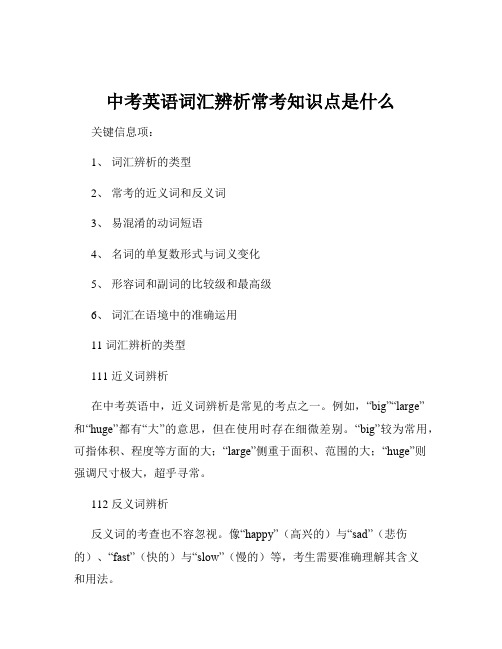
中考英语词汇辨析常考知识点是什么关键信息项:1、词汇辨析的类型2、常考的近义词和反义词3、易混淆的动词短语4、名词的单复数形式与词义变化5、形容词和副词的比较级和最高级6、词汇在语境中的准确运用11 词汇辨析的类型111 近义词辨析在中考英语中,近义词辨析是常见的考点之一。
例如,“big”“large”和“huge”都有“大”的意思,但在使用时存在细微差别。
“big”较为常用,可指体积、程度等方面的大;“large”侧重于面积、范围的大;“huge”则强调尺寸极大,超乎寻常。
112 反义词辨析反义词的考查也不容忽视。
像“happy”(高兴的)与“sad”(悲伤的)、“fast”(快的)与“slow”(慢的)等,考生需要准确理解其含义和用法。
113 形似词辨析一些词汇在拼写和发音上相似,但词义完全不同。
如“quite”(相当)和“quiet”(安静的),“accept”(接受)和“except”(除之外)。
12 常考的近义词和反义词121 常见的近义词“look”“see”“watch”都与“看”有关,但“look”强调看的动作,“see”侧重于看的结果,“watch”则常指观看活动、比赛等。
“spend”“cost”“take”“pay”都有“花费”之意,“spend”主语是人,“cost”主语是物,“take”通常用于“it takes sb some time to do sth”句型,“pay”常与“for”搭配。
122 常见的反义词“good”与“bad”、“right”与“wrong”、“many”与“few”、“much”与“little”等反义词在中考中经常出现,需要考生清晰掌握其用法和区别。
13 易混淆的动词短语131 由“put”构成的动词短语“put on”(穿上)、“put off”(推迟)、“put up”(张贴;举起)、“put away”(收拾好)等,这些短语的含义和用法各不相同。
英语中考牢记20组易混易错词语辨析
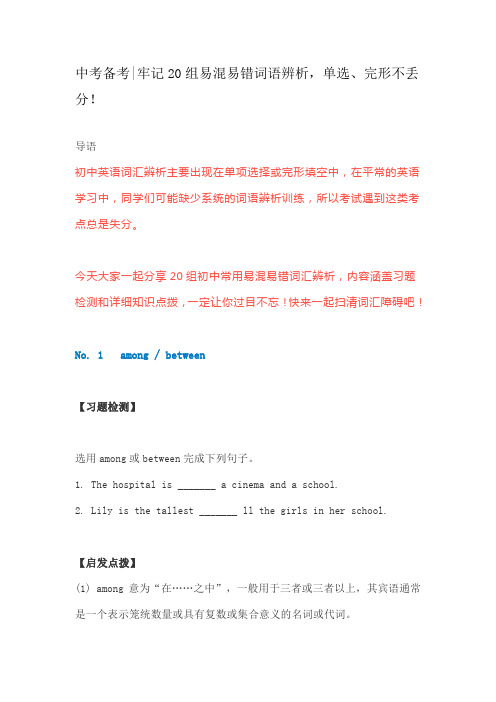
中考备考|牢记20组易混易错词语辨析,单选、完形不丢分!导语初中英语词汇辨析主要出现在单项选择或完形填空中,在平常的英语学习中,同学们可能缺少系统的词语辨析训练,所以考试遇到这类考点总是失分。
今天大家一起分享20组初中常用易混易错词汇辨析,内容涵盖习题检测和详细知识点拨,一定让你过目不忘!快来一起扫清词汇障碍吧!No. 1 among / between【习题检测】选用among或between完成下列句子。
1. The hospital is _______ a cinema and a school.2. Lily is the tallest _______ ll the girls in her school.【启发点拨】(1) among意为“在……之中”,一般用于三者或三者以上,其宾语通常是一个表示笼统数量或具有复数或集合意义的名词或代词。
(2) between一般指两者之间,其宾语通常是表示两者概念的名词或代词,或由and连接的两个具体的人或物。
between有时也可表示多者之中的“两两之间”。
如:Switzerland lies between France, Germany, Austria and Italy.Key:1. between2. amongNo. 2 lay / lie【习题检测】用lay或lie的适当形式完成句子。
1. I _______ the table when my mother cooked the meal.2. John was ill and _______ in bed all morning.【启发点拨】(1) lay作动词,可意为“摆放(餐桌)”,其过去式与过去分词均为laid,现在分词为laying,常用于短语lay the table,意为“摆放餐桌”。
如:Tom was laying the table.(2) lie作动词,意为“躺;平躺”时,过去式为lay,过去分词为lain,现在分词为lying。
中考英语易混淆英语词汇辨析名词代词连词

中考英语易混淆英语词汇辨析:名词-代词-连词一、容易混淆的名词[考试说明] 了解名词在句中所充当的成分,理解并能区别所学的可数名词和不可数名词;熟练掌握所学可数名词复数形式的构成,在口语和书面语的表达中正确运用;掌握物质名词及其数量的表达方法;了解专有名词的概念及一般用法;熟练掌握所学名词所有格的用法;了解集合名词和抽象名词的概念及一般用法。
1. job & work[误] I’m busy today, for I have a lot of jobs to do.[正] I’m busy to day, for I have a lot of work to do.job意思是a piece of work,指已做或要做、应做的具体的某种工作,实际含义是“职业”,而work通常指抽象意义上的工作,是不可数名词,也可指“工作场所”。
2. by train & change trains[误] We came here by the train.[正] We came here by train.[正] We came here on/in the train.[误] We have to change the train at the next station.[正] We have to change trains at the next station.train意思是“火车”,表示“乘火车”,用by train或on/ the train,表示“换火车”,train必须用复数形式,且前面不加限定词。
二、容易混淆的代词:[考试说明] 熟练掌握人称代词主格、宾格形式及基本用法,在口语和书面语的表达中正确运用;掌握形容词性物主代词和名词性物主代词的基本用法;掌握反身代词作为宾语和同位语的基本用法;熟练掌握指示代词和疑问代词的基本用法.1. either & each & none & neither & both & all & some[误] Either of the books are good.[正] Either of the books is good.either/ each / none / neither of+复数名词或代词作主语时,谓语动词用单数, 其中neither的也可用复数;both/ all /some of+复数名词或代词作主语时,谓语动词用复数三、容易混淆的连词:[考试说明] 掌握并列连词(如:and、but、or)和从属连词(如:when、if、that等)的基本用法。
中考英语易混词汇辨析:fine, nice, good, well

词汇辨析:fine, nice, good, well本站原创| 2015-08-26分享到:四者都可用作形容词表示"好"之意,但前三者既可作表语又可作定语,而后者仅用作表语。
主要区别在于:(1) fine指物时表示的是质量上的"精细",形容人时表示的是"身体健康",也可以用来指"天气晴朗"。
例如:Your parents are very fine. 你父母身体很健康。
That's a fine machine.那是一台很好的机器It's a fine day for a walk today.今天是散步的好时候。
(2)nice主要侧重于人或物的外表,有"美好","漂亮"的意思,也可用于问候或赞扬别人。
例如:Lucy looks nice. 露西看上去很漂亮。
These coats are very nice. 那些裙子很好看。
Nice to meet you. 见到你很高兴。
It's very nice of you. 你真好。
(3)good形容人时指"品德好",形容物时指"质量好",是表示人或物各方面都好的普通用语。
例如:Her son is a good student. 她儿子是一个好学生。
The red car is very good. 那辆红色小汽车很好。
(4)well只可用来形容人的"身体好",但不能作定语,它也能用作副词作状语,多放在所修饰的动词之后。
例如:I'm very well, thanks. 我身体很好,谢谢。
My friends sing well. 我的朋友们歌唱得好。
初中生易错易混英语词汇解析

初中生易错易混英语词汇解析初中生易错易混英语词汇解析导语:随着中国逐渐走进国际化,使用英语的范围也越来越广,现在在日常的生活中许多地方都用得到英语。
以下是小编为大家精心整理的初中生易错易混英语词汇解析,欢迎大家阅读参考!1、hunting is allowed in this area, though not officially permitted.这个地区是可以狩猎的,尽管法律上不允许。
allow指“听凭”,“不禁止”,含有消极的意味。
permit指正式地“允许”或根据法律规定“许可”, 比allow来得积极。
2、i received his gift from him, but i didn’t accept it .我收到他的礼物,但我没有接受。
3、you should be ashamed of your shameful behaviors.你应该为你的可耻的行为感到羞愧。
4、the boss insisted that the man had stolen the money and insisted that he (should) leave the company at once.老板坚持说那个人偷了钱并坚持要求他立刻离开公司。
5、there are so many cakes for me to choose from that i can’t make up my mind which to choose.有那么多的蛋糕可供从中选择,我无法决定选择哪一个。
6、be sure to get to the airport on time, and make sure everything is ready before you start.务必要准时到机场并且确保在出发前一切都准备好了。
7、it seemed that she was not a bit worried, but in fact, she was not a little worried about it.表面看来她似乎一点也不担心,事实上她非常担心。
易混辨析

2012武汉市开发区一初中 中考英语总复习 易混词汇辨析take spend cost pay 的用法都可以表示“花费”,但用法却不尽相同。
常用于以下结构:(1) spend time /money on sth. 在……上花费时间(金钱)。
例:I spent two hours on this maths problem. 这道数学题花了我两个小时。
(2) spend time / money (in) doing sth. 花费时间(金钱)做某事。
例:They spent two years (in) building this bridge. 造这座桥花了他们两年时间。
(3)spend money for sth. 花钱买……。
例:His money was spent for books. 他的钱用来买书了。
还可以表示“值”, 常见用法如下: (1)sth. costs (sb.) +金钱,某物花了(某人)多少钱。
例:A new computer costs a lot of money. 买一台新电脑要花一大笔钱。
(2) (doing) sth. costs (sb.) +时间,某物(做某事)花了(某人)多少时间。
例:Remembering these new words cost him a lot of time. 他花了大量时间才记住了这些单词。
注意:cost 的过去式及过去分词都是cost,并且不能用于被动句。
常见用法有以下几种:(1) It takes sb. +时间+to do sth. 做某事花了某人多少时间。
例:It took them three years to build this road. 他们用了三年时间修完了这条路。
(2)doing sth. takes sb.+时间,做某事花了某人多少时间。
例:Repairing this car took him the whole afternoon. 他花了一下午修车。
中考英语之易混淆词汇知识点辨析
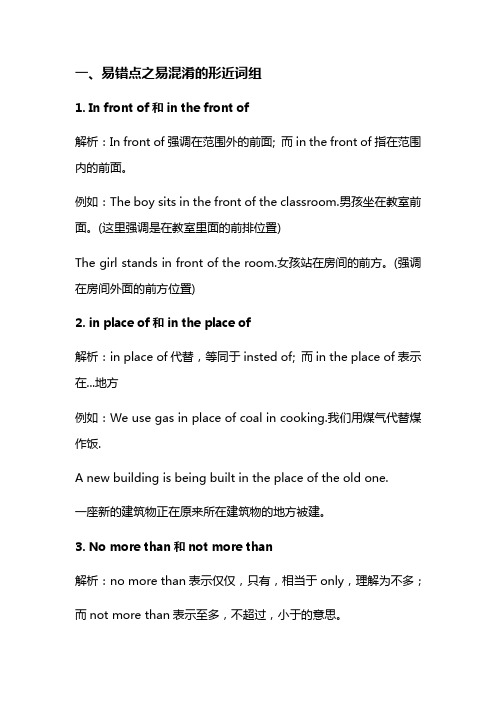
一、易错点之易混淆的形近词组1.In front of和in the front of解析:In front of强调在范围外的前面; 而in the front of指在范围内的前面。
例如:The boy sits in the front of the classroom.男孩坐在教室前面。
(这里强调是在教室里面的前排位置)The girl stands in front of the room.女孩站在房间的前方。
(强调在房间外面的前方位置)2.in place of和in the place of解析:in place of代替,等同于insted of; 而in the place of表示在...地方例如:We use gas in place of coal in cooking.我们用煤气代替煤作饭.A new building is being built in the place of the old one.一座新的建筑物正在原来所在建筑物的地方被建。
3.No more than和not more than解析:no more than表示仅仅,只有,相当于only,理解为不多;而not more than表示至多,不超过,小于的意思。
例如:He is no more than an ordinary English teacher. 他只不过是个普通的英文老师。
He has not more than three children. 他最多3 个孩子(有或许还不到三个)4.On earth和on the earth解析:两者都有在地上,在地球上的意思,但on earth还有到底,究竟的意思;On the earth只是单纯的表示在地上,在地球上例如:where on earth did you spring from?你究竟从哪里冒出来的?What if there was no lead on the earth at all?如果地球上根本就没有铅这种物质怎么办?5.At all和after all解析:at all表示根本,全然的意思,常用短语not at all表示一点也不;after all表示到底,毕竟的意思例如:I don't know him at all. 我根本不认识他。
初中英语中考词汇辨析(共14组)
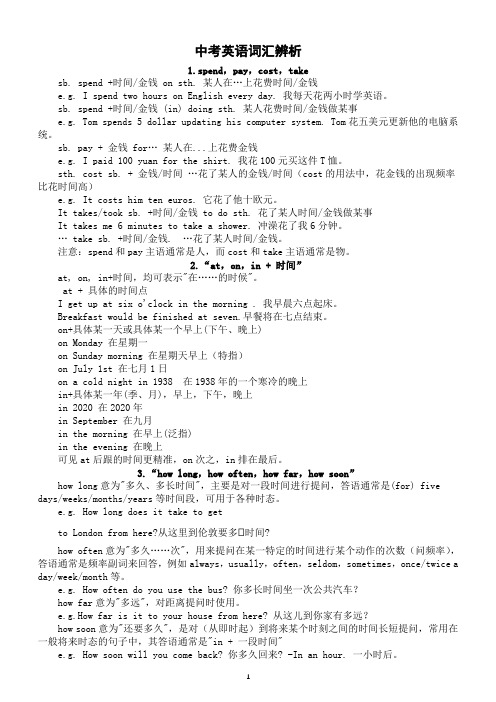
中考英语词汇辨析1.spend,pay,cost,takesb. spend +时间/金钱 on sth. 某人在…上花费时间/金钱e.g. I spend two hours on English every day. 我每天花两小时学英语。
sb. spend +时间/金钱 (in) doing sth. 某人花费时间/金钱做某事e.g. Tom spends 5 dollar updating his computer system. Tom花五美元更新他的电脑系统。
sb. pay + 金钱 for…某人在...上花费金钱e.g. I paid 100 yuan for the shirt. 我花100元买这件T恤。
sth. cost sb. + 金钱/时间…花了某人的金钱/时间(cost的用法中,花金钱的出现频率比花时间高)e.g. It costs him ten euros. 它花了他十欧元。
It takes/took sb. +时间/金钱 to do sth. 花了某人时间/金钱做某事It takes me 6 minutes to take a shower. 冲澡花了我6分钟。
… take sb. +时间/金钱. …花了某人时间/金钱。
注意:spend和pay主语通常是人,而cost和take主语通常是物。
2.“at,on,in + 时间”at, on, in+时间,均可表示"在……的时候"。
at + 具体的时间点I get up at six o'clock in the morning . 我早晨六点起床。
Breakfast would be finished at seven.早餐将在七点结束。
on+具体某一天或具体某一个早上(下午、晚上)on Monday 在星期一on Sunday morning 在星期天早上(特指)on July 1st 在七月1日on a cold night in 1938 在1938年的一个寒冷的晚上in+具体某一年(季、月),早上,下午,晚上in 2020 在2020年in September 在九月in the morning 在早上(泛指)in the evening 在晚上可见at后跟的时间更精准,on次之,in排在最后。
中考英语易混词汇辨析

有一些
r H.冃疋
Though the man has bee n here for only one month he hasa fewfriends.
尽管这个人才在这里住了一个月,但他就有了一 些朋友。
little
几乎没
有
不可数
否定
There islittlewater in the glass, so you can any.
I havealreadyfin ished it.我已经做完了。
Is it Sun dayalready?
已经到星期天啦?
yet
通常用于疑问句和否定句,
在疑冋句中意为已经”在
否疋句中意为还,尚未
I haven't learneyet我还不知道此事。
Has he comeyet?
他还没来吗?(表疑问)
她一点也不喜欢足球。
after
all
毕竟,终究,到底”,一般置于句 首或句末作状语
After all, he is a child.毕竟.他还是个孩子。
few/a few/little/a little
词汇
含义
修饰名词
肯定/否定
例句
few
几乎没
有
可数
否定
I am a new comer here, so I havfewfrie nds here.我刚来到这里,所以我在这里没有几个朋友。
圆学子梦想
铸金字品牌
answer/ reply
词汇
含义
用法
例句
answer
回答, 答复
它可以用作及物动词或不 及物动词
Heansweredmy questi on.
初中英语中考复习重点词汇辨析(共10组)
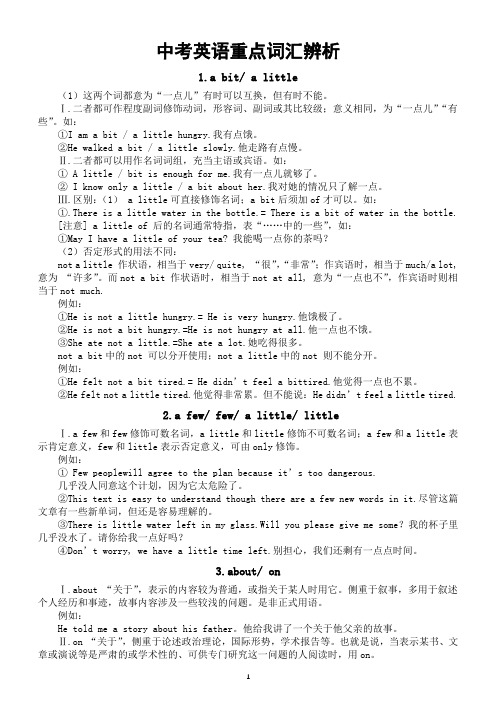
中考英语重点词汇辨析1.a bit/ a little(1)这两个词都意为“一点儿”有时可以互换,但有时不能。
Ⅰ.二者都可作程度副词修饰动词,形容词、副词或其比较级;意义相同,为“一点儿”“有些”。
如:①I am a bit / a little hungry.我有点饿。
②He walked a bit / a little slowly.他走路有点慢。
Ⅱ.二者都可以用作名词词组,充当主语或宾语。
如:① A little / bit is enough for me.我有一点儿就够了。
② I know only a little / a bit about her.我对她的情况只了解一点。
Ⅲ.区别:(1) a little可直接修饰名词;a bit后须加of才可以。
如:①.There is a little water in the bottle.= There is a bit of water in the bottle.[注意] a little of 后的名词通常特指,表“……中的一些”,如:①May I have a little of your tea? 我能喝一点你的茶吗?(2)否定形式的用法不同:not a little 作状语,相当于very/ quite, “很”,“非常”;作宾语时,相当于much/a lot, 意为“许多”。
而not a bit 作状语时,相当于not at all, 意为“一点也不”,作宾语时则相当于not much.例如:①He is not a little hungry.= He is very hungry.他饿极了。
②He is not a bit hungry.=He is not hungry at all.他一点也不饿。
③She ate not a little.=She ate a lot.她吃得很多。
not a bit中的not 可以分开使用;not a little中的not 则不能分开。
中考英语易混词汇辨析
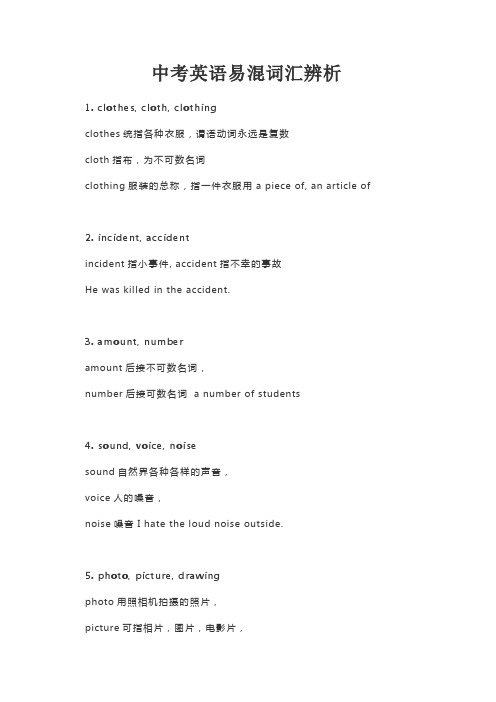
中考英语易混词汇辨析1. clothes, cloth, clothingclothes统指各种衣服,谓语动词永远是复数cloth指布,为不可数名词clothing服装的总称,指一件衣服用a piece of, an article of2. incident, accidentincident指小事件, accident指不幸的事故He was killed in the accident.3. amount, numberamount后接不可数名词,number后接可数名词 a number of students4. sound, voice, noisesound自然界各种各样的声音,voice人的嗓音,noise噪音I hate the loud noise outside.5. photo, picture, drawingphoto用照相机拍摄的照片,picture可指相片,图片,电影片,drawing画的画Let's go and see a good picture.6. weather, climateweather一天内具体的天气状况,climate长期的气候状况The climate here is not good for you.7. road, street, path, wayroad具体的公路,马路,street街道,path小路,小径,way道路,途径take this road; in the street, show me the way to the museum.8. course, subjectcourse课程(可包括多门科目),subject科目(具体的学科)a summer course9. custom, habitcustom传统风俗,习俗,也可指生活习惯,后接to do,habit生活习惯,习惯成自然,后接of doing.I've got the habit of drinking a lot.10. cause, reasoncause指造成某一事实或现象的直接原因,后接of sth./doing sth,reason用来解释某种现象或结果的理由,后接for sth./doing sth. the reason for being late11. exercise, exercises, practiceexercise运动,锻炼(不可数),exercises练习(可数),practice(反复做的)练习Practice makes perfect.12. class, lesson作"课"解时,两者可以替换.指课文用lesson.指班级或全体学生用class. lesson 6; class 513. speech, talk, lecturespeech指在公共场所所做的经过准备的较正式的演说,talk日常生活中的一般的谈话,讲话,lecture学术性的演讲,讲课 a series of lecture on…14. work, job二者均指工作。
中考英语完形填空高频词汇辨析
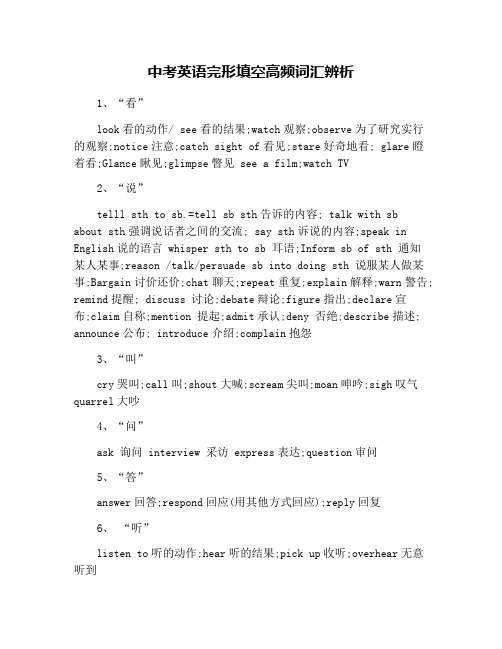
中考英语完形填空高频词汇辨析1、“看”look看的动作/ see看的结果;watch观察;observe为了研究实行的观察;notice注意;catch sight of看见;stare好奇地看; glare瞪着看;Glance瞅见;glimpse瞥见 see a film;watch TV2、“说”telll sth to sb.=tell sb sth告诉的内容; talk with sbabout sth强调说话者之间的交流; say sth诉说的内容;speak in English说的语言 whisper sth to sb 耳语;Inform sb of sth 通知某人某事;reason /talk/persuade sb into doing sth 说服某人做某事;Bargain讨价还价;chat聊天;repeat重复;explain解释;warn警告; remind提醒; discuss 讨论;debate辩论;figure指出;declare宣布;claim自称;mention 提起;admit承认;deny 否绝;describe描述; announce公布; introduce介绍;complain抱怨3、“叫”cry哭叫;call叫;shout大喊;scream尖叫;moan呻吟;sigh叹气quarrel大吵4、“问”ask 询问 interview 采访 express表达;question审问5、“答”answer回答;respond回应(用其他方式回应);reply回复6、“听”listen to听的动作;hear听的结果;pick up收听;overhear无意听到7、“写”dictate听写;write sth 写 describe描写;drop a line 写信draw画take down/write down写下,记下8、“拿/放”take拿走;bring拿来;hold举着;carry扛,挑 (无方向性) fetch拿来拿去;lift举;Put放 lay 铺/放置;pull拉/push推9、“抓”take hold of 抓着 seize紧抓;grasp 握住;scratch 抠10、“打”hit一次性的打击;beat不间断的打击;strike突然的击打/突然想到;blow吹刮;attack攻击11 “扔”throw扔;drop掉放弃错过;fall 倒下无意掉下来;wave 招手;shake摇12 “送”send寄送; deliver递送;give给;offer 主动给予;see off给某人送行13“摸/抱”touch摸 ;fold折叠;embrace拥抱;hug抱;hold 握14“踢/碰”kick踢;knock敲;tip 轻敲15“行”walk走; run跑; climb爬; jump跳; skip 单腿跳; slip溜; come/go enter进入; move搬迁; drive开车; ride 骑;fly 飞 ; crawl 匍匐前进16“坐”sit down / be seated /seat oneself 坐下; take a seat/ stand站,耸立/ lean斜靠17“睡/休息”lie /on one’s back/ on one side/ on one’s stomach stay in bed have a resttake a nap打盹 be asleep bend turn over翻身 rest。
- 1、下载文档前请自行甄别文档内容的完整性,平台不提供额外的编辑、内容补充、找答案等附加服务。
- 2、"仅部分预览"的文档,不可在线预览部分如存在完整性等问题,可反馈申请退款(可完整预览的文档不适用该条件!)。
- 3、如文档侵犯您的权益,请联系客服反馈,我们会尽快为您处理(人工客服工作时间:9:00-18:30)。
起早一点你就会看到那位明星了。
a bit
He atealittle/abit offood this morning.
他今天早上就吃了一点食物。
as/like
词汇
含义
用法
例句
as
像
作介词,意为“以……的身份;作为”
He arrivedin Nanninglast week.
他上星期来到南宁。
reach
是及物动词,后直接跟地点名词作宾语
Please writetomewhen youreach Beijing.
你到北京后请给我写信。
get to
后接副词here,there,home时,要省略to
Whendid yougethomeyesterday?
太阳升到了地平线以上。
over
“在……上面”,含有垂直在上的意思
Thereis a bridgeovertheriver.
河上有座桥。
on
“在……上面”,含有与表面相接触的意思
Thereis an oil paintingonthewall.
墙上有一幅油画。
across/through
词汇
用法
例句
across
我下午五点钟前到了那里。
Ineversawhimbefore.
我以前没见过他。
alone/lonely
词汇
用法
一言辨义
alone
“单独的”,只能作表语,强调数量单一
Helivesalone, buthe never feelslonely.
他独自一人生活着,但是他从不感到寂寞。
lonely
“孤独的,寂寞的”,强调心理感受
尽管这个人才在这里住了一个月,但他就有了一些朋友。
little
几乎没有
不可数
否定
Thereislittlewater inthe glass,soyoucan’t drink any.
杯子里几乎没有水了,你不可能喝到水了。
alittle
有一些
肯定
Thereisa littlewaterinthe glass.
杯子里有一些水。
ago/ before
词汇
含义
用法
例句
ago
以前
只用于一般过去时,表示从现在算起的一段时间以前
Hedied twoyearsago.
他是两年前去世的。
before
后接“时间点”,可用于任何时态;它也可放在“时间段”后,用于完成时或一般过去时
I gottherebefore5o’clockintheafternoon.
词汇
含义
修饰名词
肯定/否定
例句
few
几乎没有
可数
否定
Iam a newcomer here, so I havefewfriendshere.
我刚来到这里,所以我在这里没有几个朋友。
afew
有一些
肯定
Though the man has beenhereforonlyone month,hehasa fewfriends.
中美双方就下次会议的时间、地点问题达成了一致。
agree to
表示“同意,认同”,宾语一般为“计划、安排”
Weallagreed toyour plan.
我们都同意你的计划。
alittle/abit
词汇
相同点
不同点
例句
alittle
表示“一点儿”,都可修饰形容词、副词及其比较级,也可修饰动词
alittle后可直接接不可数名词,a bit若修饰不可数名词必须用abitof
你昨天什么时候到的家?
agreewith/agreeon/agreeto
词汇
用法
例句
agreewith
表示“与……意见一致”
I don’tagree withyou.
我不同意你的意见。
agreeon
表示“双方就……达成一致协议”
China and theU.S.A.agreedontheplace andtime forthenextmeeting.
“横过,穿过”,指从……的一边到另一边
Becarefulwhen youwalkacrossthe road.
当你过马路的时候要小心。
through
“穿过”,强调从内部穿过
Theriverflowsthroughthe cityfromwesttoeast.
这条河从西到东流过城市。
atall/after all
ห้องสมุดไป่ตู้中考英语易混词汇辨析
———————————————————————————————— 作者:
———————————————————————————————— 日期:
中考英语易混词汇辨析
above/over/on
词汇
用法
例句
above
“在……上方”,不一定含有垂直在上的意思。反义词为:below
Thesun roseabovethehorizon.
这是一个难以回答的问题。
reply
常用作不及物动词,回答某人或某事,后接to
Ididn’treplyto him.
我没有答复他。
arrive /reach/getto
词汇
含义
用法
例句
arrive
到达
是不及物动词,arrive+ in +大地方(国家、城市等);arrive+ at+小地方(村庄、车站、码头等)
Sheworksasaninterpreter in that company.
Ihaven’tlearned ityet.我还不知道此事。ﻫHashecomeyet?
他还没来吗?(表疑问)
answer/ reply
词汇
含义
用法
例句
answer
回答,答复
它可以用作及物动词或不及物动词
Heansweredmy question.
他回答了我的问题。
It is a difficult question toanswer.
already/ yet
词汇
含义
用法
例句
already
已经
常用于肯定句,多与完成时和进行时连用。用于疑问句时表示问话人持怀疑、惊异的态度
I havealreadyfinishedit.我已经做完了。
IsitSundayalready?
已经到星期天啦?
yet
通常用于疑问句和否定句,在疑问句中意为“已经”,在否定句中意为“还,尚未”
词汇
用法
例句
atall
“全然,根本不”,一般用于否定句中加强语气
Shedoesn’tlikefootballatall.
她一点也不喜欢足球。
after all
“毕竟,终究,到底”,一般置于句首或句末作状语
Afterall, heisa child.毕竟,他还是个孩子。
few/a few/little /a little
